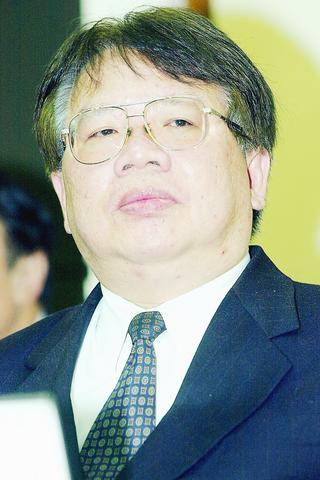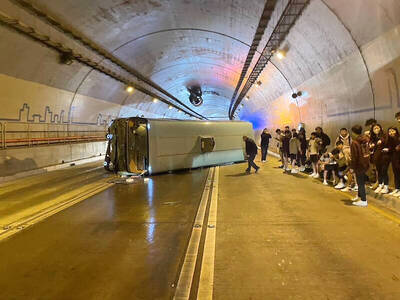Taipei Times: There are rumors that your resignation was the result of your frustration toward the job. What would you say to that?
Chang Jung-feng (

PHOTO: CHIANG YING-YING, TAIPEI TIMES
After talking to President Chen on May 26th, the president agreed to my resignation. I will return to the Chung-Hua Institution for Economic Research on June 16th and continue to offer my service to the country and the government. The NSC is limited in resources, manpower, and budget. The private academic institution may take the responsibility to do earlier government research work and its research results may also be provided for reference for the NSC.
TT: What are your short- and long-term plans after returning to the research institute?
Chang: Basically, my personality is neither aggressive nor heroic. I think highly of teamwork and believe the success of a mission depends on whether the entire system can operate smoothly. I believe that one person's strength never exceeds that of an organization, so I need to work with the institute and then figure out plans. I hope I can share my experience with the private sector and help it make judgments and deal with hardships.
TT: Some members at the NSC have shown disagreement with the new NSC Secretary-General Kang Ning-hsian's (康寧祥) style of leadership, and some have even implied that Kang's leadership is a major reason you left. What would you say to that?
Chang: Kang and I have been friends for over two decades. These speculations are groundless, and I would not make any comments on them. But a majority of advisory members [of the council] indeed have expressed disagreement with Kang's style of leadership.
The NSC has five advisory members and three deputy secretary-generals who take care of different fields. Unless they are assigned to work together on the same mission, they usually do not interfere with one another.
After Kang took office, he gave every member of the NSC many new instructions. However, his aides did not have the ability and experience to carry out the instructions, so it did not work well.
TT: Will this affect the stability of the NSC?
Chang: I've always said that the national security system should always look ahead. Its "sense of timing" should be at least half a year ahead of that of the general public. We need to prepare and analyze every variable and address the problems in advance. The national security system should be a pre-emptive organization. But it now looks as if it has lost that function and become a crisis management one.
I think Kang's leadership style is not a problem. But I suggest President Chen take the oppotunity to discuss the reform and readjustment of the system. In the mean time, some have tried to use my resignation to initiate a "political struggle" campaign by spreading rumors to attack their targets, which is normal in polictics. That does not mean the operation of the NSC has serious problem.
TT: What projects have been the most worthwhile to you during your 13 years as a national security official?
Chang: It is still too early to speak of the history. I have to reiterate that all the top projects are the result of teamwork. For example, during the 1996 [presidential election], I was in charge of the missile crisis triggered by China.
The NSC successfully made a favorable campaign of the crisis by using China's missile threat to shape an united domestic consensus that helped [former president] Lee [Teng-hui (李登輝)] win a second term. In addition, by establishing several international security cooperation networks, we managed to give Taiwan more visibility in the international community.
TT: Could you draw a comparison of the leadership between Lee and Chen?
Chang: Lee and Chen are leaders of different generations. They are in different environments of time and space and their personalities are also different. So, any comparison would be irrelevant.
But I may cite something that has been said by some political observers who generally believe Lee's political operation was more based on long-term strategy and he paid attention to the change of "power domain," while Chen and his aides tend to give priority to "the media or the public opinion presented by the media," which aims more at short-term effectiveness. I appreciate both presidents for giving me respect and allowing me to stick to my own style over the past 13 years.
This is something one should be proud of, especially when one stays in the core of power.

The Central Weather Administration (CWA) today issued a "tsunami watch" alert after a magnitude 8.7 earthquake struck off the Kamchatka Peninsula in northeastern Russia earlier in the morning. The quake struck off the east coast of the Kamchatka Peninsula at 7:25am (Taiwan time) at a depth of about 19km, the CWA said, citing figures from the Pacific Tsunami Warning Center. The CWA's Seismological Center said preliminary assessments indicate that a tsunami could reach Taiwan's coastal areas by 1:18pm today. The CWA urged residents along the coast to stay alert and take necessary precautions as waves as high as 1m could hit the southeastern

The National Museum of Taiwan Literature is next month to hold an exhibition in Osaka, Japan, showcasing the rich and unique history of Taiwanese folklore and literature. The exhibition, which is to run from Aug. 10 to Aug. 20 at the city’s Central Public Hall, is part of the “We Taiwan” at Expo 2025 series, highlighting Taiwan’s cultural ties with the international community, National Museum of Taiwan Literature director Chen Ying-fang (陳瑩芳) said. Folklore and literature, among Taiwan’s richest cultural heritages, naturally deserve a central place in the global dialogue, Chen said. Taiwan’s folklore would be immediately apparent at the entrance of the

Speeding and badly maintained roads were the main causes of a school bus accident on a rainy day in Taipei last year that severely injured two people and left 22 with minor injuries, the Taiwan Transportation and Safety Board said. On March 11 last year, a Kang Chiao International School bus overturned inside the Wenshan Tunnel (文山隧道) on the northbound lane of the Xinyi Expressway. The tour bus, owned by Long Lai Co, exceeded the speed limit after entering the tunnel, the board’s investigation found. Sensing that the rear of the vehicle was swaying, the driver attempted to use the service and exhaust

“China is preparing to invade Taiwan,” Deputy Minister of Foreign Affairs Francois Wu (吳志中) said in an exclusive interview with British media channel Sky News for a special report titled, “Is Taiwan ready for a Chinese invasion?” the Ministry of Foreign Affairs said today in a statement. The 25-minute-long special report by Helen Ann-Smith released yesterday saw Sky News travel to Penghu, Taoyuan and Taipei to discuss the possibility of a Chinese invasion and how Taiwan is preparing for an attack. The film observed emergency response drills, interviewed baseball fans at the Taipei Dome on their views of US President